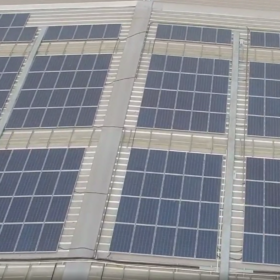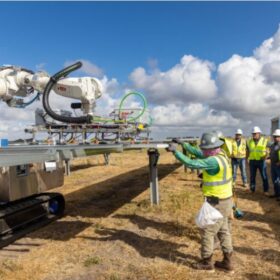Hitachi Energy in India has introduced Grid-enSure, a fully integrated portfolio that enhances grid flexibility, resilience, and stability to accelerate the sustainable energy transition. The portfolio combines Hitachi Energy’s existing and future power electronic solutions such as high-voltage direct current (HVDC), static compensators, static frequency converters, medium-voltage direct current, energy storage solutions and semiconductor technologies.
The control systems provide a microsecond response to address the grid’s needs, providing the required flexibility with the help of advanced control functionalities such as grid-forming, synthetic inertia, fast-frequency response, voltage control, interoperability, and much more.
“Grid-enSure brings a new holistic approach to designing, planning, and operating present and future power systems. The portfolio is based on Hitachi Energy’s extensive advisory and consulting services for grid development and modernization, an in-house verticalized value chain for power electronics and advanced control systems, and strong power system domain and control engineering expertise,” stated Hitachi Energy.
India targets 500 GW of installed renewable energy capacity by 2030. As of August 2024, 200 GW of renewable energy had already been installed, with a little over 300 GW currently waiting in grid connection queues. In addition, another 51 million km of transmission lines and 434 GVA of substations are needed to integrate additional wind and solar capacities by 2030. This systematic transition to non-fossil-based energy sources will keep adding extra load to the country’s grid ecosystem, which will impact the health of the grid. Thus, upgrading the existing power system is essential for achieving the country’s mid-term energy milestone and supporting the larger goal of the net-zero target.
By introducing Grid-enSure in India, Hitachi Energy aim to address the challenges in integrating renewables into power systems. This innovative solution portfolio will play a pivotal role in strengthening the grid ecosystem in the country.
Investment plans
Hitachi Energy India also announced its plans to invest around INR 2,000 crore over the next four to five years. The company will invest this amount in a significant capacity expansion of the large power transformers factory, upgrade testing capabilities for specialty transformers at the small power transformers and the relocation of the bushings factory. The capacity of the traction transformers factory will also be boosted to support the modernization of the Indian railway network.
“As the energy transition gathers pace with increased electrification and integration of renewables, power grids are becoming increasingly significant both from a capacity and complexity perspective. We remain focused on advancing a sustainable energy future for all and India is an important market in our effort to make the world’s energy system more sustainable, flexible, and secure,” said Andreas Schierenbeck, global CEO of Hitachi Energy. “The new investments are geared toward expanding and upgrading capacity and talent, strengthening supply chain and enabling flexibility through digitalization in line with the Hitachi Energy 2030 strategic growth plan.”
“These investments anticipate India’s future energy requirement – to accelerate new energy transition and sustainable electrification – and the evolving nature of collaboration with customers and other stakeholders locally and in global markets, especially through digitalization and a lifecycle partner,” said N Venu, Managing Director and CEO, Hitachi Energy India.
This content is protected by copyright and may not be reused. If you want to cooperate with us and would like to reuse some of our content, please contact: editors@pv-magazine.com.









By submitting this form you agree to pv magazine using your data for the purposes of publishing your comment.
Your personal data will only be disclosed or otherwise transmitted to third parties for the purposes of spam filtering or if this is necessary for technical maintenance of the website. Any other transfer to third parties will not take place unless this is justified on the basis of applicable data protection regulations or if pv magazine is legally obliged to do so.
You may revoke this consent at any time with effect for the future, in which case your personal data will be deleted immediately. Otherwise, your data will be deleted if pv magazine has processed your request or the purpose of data storage is fulfilled.
Further information on data privacy can be found in our Data Protection Policy.